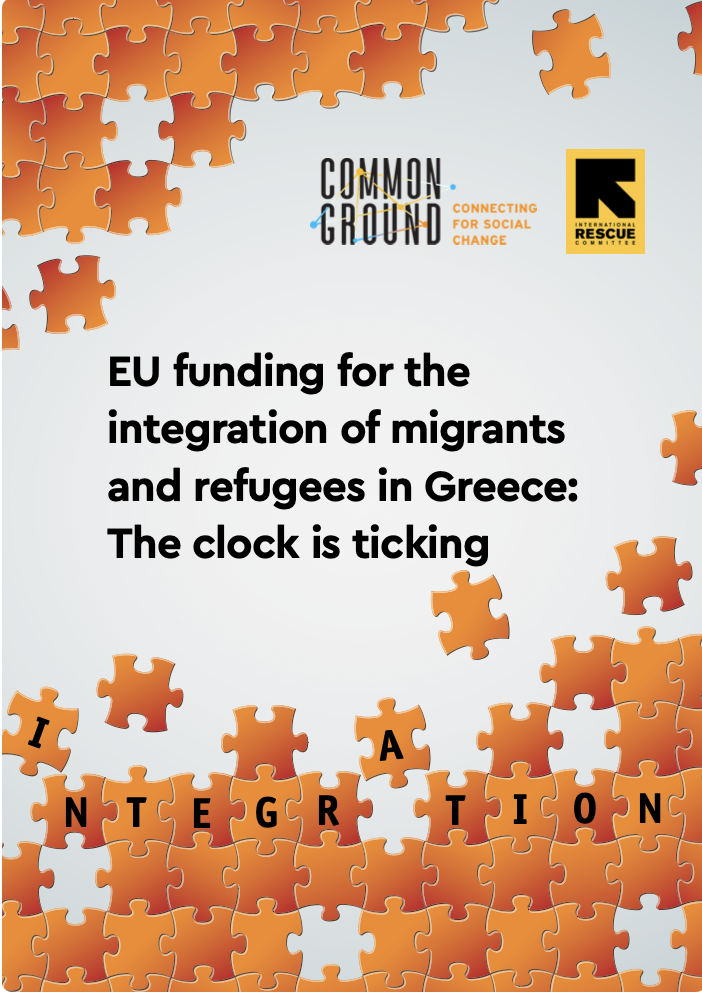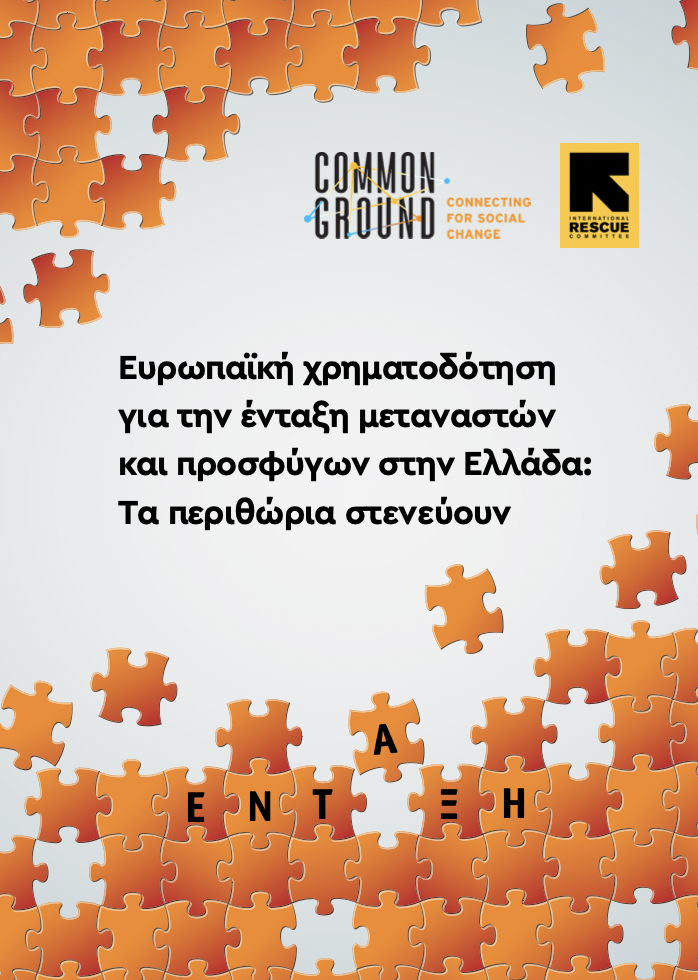
How can Greece make better use of available EU funds for supporting the integration of newcomers into society? Together with the International Rescue Committee (IRC), we brought together key stakeholders for meetings and workshops to identify inadequacies of previous plans and brainstorm solutions. This research culminated in a policy brief funded by the European Council on Refugees and Exiles (ECRE).
…
Although there have been improvements over the past year to the way integration programs are carried out and funds are managed, the report finds that serious gaps persist in national integration planning.
Alarmingly, COVID-19 has exacerbated existing barriers to integration, making access to information, housing, employment, and education even more challenging and exacerbating anxiety, uncertainty and fear of destitution.
“The pandemic has cast a light on the urgent need for digitized services, improving digital literacy skills, and more integrated databases that enable refugees and migrants to access services remotely,” said Common Ground’s co-founder, Melina Spathari. “Implementing the EU Action Plan on Integration and Inclusion could provide valuable assistance to national and local authorities in minimizing the impact of COVID-19 and investing in the integration of migrants and refugees into society.”
The report – EU Funding for the Integration of Migrants and Refugees in Greece: Τhe Clock is Ticking – comes at a critical juncture for integration policy, as the EU has already begun implementing its six-year Action Plan on Integration and Inclusion, while the Greek Ministry of Immigration and Asylum is in the final stages of formulating its new National Strategy for Integration.
Meanwhile, the EU is seeking to provide a holistic response to migration through its New Pact on Migration and Asylum – an initiative supported by two major financial instruments: The Multiannual Financial Framework (MMF) (2021-2027) and the Next Generation European Union Recovery Fund (NGEU) (2021-2023).
Dimitra Kalogeropoulou, Director General of IRC in Greece, explains, “In moving toward a ‘green’ and fair future in Greece, as elsewhere, it is vital that our country take advantage of these funding opportunities to implement holistic integration programs in a more strategic way.”
The IRC and Common Ground collected data through meetings with a range of stakeholders including the Ministry of Migration and Asylum, the European Commission’s Directorate-General for Migration and Home Affairs (DG HOME), EU funding instruments, municipalities, and municipal development entities, as well as international organizations and NGOs.
“In Greece, sufficient coordination and cooperation between the funding bodies has not been achieved so far, resulting in only limited progress on the social inclusion of refugees and migrants,” says IRC Advocacy Manager Martha Roussou, who co-authored the report with migration expert Dominika Spyratou. She adds: “The full integration of all people who have received international protection in Greece since January 2015 as well as asylum seekers is vital not only for their survival and ability to thrive, but also for social cohesion. Since both the Greek and migrant communities can only benefit from this effort, it is important not to miss this opportunity.”
Read the full text of the report in English and Greek.
- For more information and to arrange interviews, please contact: IRC at martha.roussou@rescue.org , Common Ground at melina@commongroundgreece.gr
- This is an initiative in collaboration with ECRE and PICUM, supported by the European Programme for Integration and Migration (EPIM), a collaborative initiative of the Network of European Foundations (NEF).
read the report
διαβάστε την έκθεση

Τα περιθώρια στενεύουν για το σχεδιασμό μέτρων ένταξης προσφύγων/ισσών και μεταναστών/ριών στην Ελλάδα, σύμφωνα με μία νέα έκθεση που δημοσιεύεται σήμερα από δύο οργανώσεις της κοινωνίας των πολιτών.
Μια νέα έκθεση από δύο οργανώσεις της κοινωνίας των πολιτών, την International Rescue Committee και την Common Ground, αποκαλύπτει πώς τα ευρωπαϊκά κονδύλια θα μπορούσαν να επενδυθούν πιο αποτελεσματικά για την ενίσχυση της ένταξης των προσφύγων και των μεταναστών στην Ελλάδα.
Παρόλο που τον τελευταίο χρόνο έχουν σημειωθεί βελτιώσεις στις προσπάθειες ένταξης και στη διαχείριση κονδυλίων στην Ελλάδα, εξακολουθούν να υπάρχουν σοβαρά κενά στον εθνικό προγραμματισμό ένταξης.
Είναι εξαιρετικά ανησυχητικό, πως ο COVID-19 έχει επιδεινώσει τα υφιστάμενα εμπόδια της ένταξης, κάνοντας ακόμα πιο απαιτητική την πρόσβαση στην πληροφόρηση, τη στέγαση, την απασχόληση και την εκπαίδευση, ενώ έχει αυξήσει το άγχος, την αβεβαιότητα και το φόβο της ανέχειας.
«Η πανδημία έφερε στην επιφάνεια την ανάγκη αυξημένης ψηφιοποίησης, βελτίωσης των ψηφιακών δεξιοτήτων και ανάπτυξης πιο ολοκληρωμένων βάσεων δεδομένων, δίνοντας τη δυνατότητα σε πρόσφυγες/ισσες και σε μετανάστες/ριες να έχουν πρόσβαση στις υπηρεσίες από απόσταση» εξηγεί η εκπρόσωπος της Common Ground, Μελίνα Σπαθάρη, προσθέτοντας: «Η υλοποίηση του Σχεδίου Δράσης της ΕΕ για την ενσωμάτωση και την ένταξη θα μπορούσε να προσφέρει πολύτιμη βοήθεια στις εθνικές και τοπικές αρχές για το πώς θα ελαχιστοποιηθεί ο αντίκτυπος του COVID-19 και θα γίνουν επενδύσεις στην ένταξη των μεταναστών και προσφύγων στην κοινωνία».
Η έκθεση των δύο οργανώσεων «Ευρωπαϊκή χρηματοδότηση για την ένταξη μεταναστών και προσφύγων στην Ελλάδα: Τα περιθώρια στενεύουν», έρχεται σε μια κρίσιμη για την ένταξη συγκυρία, καθώς από την πλευρά της η ΕΕ έχει ήδη ξεκινήσει την υλοποίηση του 6ετούς Σχεδίου Δράσης της για την Ένταξη και την Ενσωμάτωση (2021-2027) ενώ η νέα Εθνική Στρατηγική για την Ένταξη, του υπουργείου Μετανάστευσης και Ασύλου, βρίσκεται στο τελευταίο στάδιο της διαμόρφωσής της.
Παράλληλα, η Ευρωπαϊκή Ένωση στοχεύει σε μία ολιστική προσέγγιση στη μετανάστευση μέσω του πρόσφατου Συμφώνου για τη Μετανάστευση και το Άσυλο – μία πρωτοβουλία που θα υποστηριχθεί από δύο μεγάλα χρηματοδοτικά μέσα: το Πολυετές Δημοσιονομικό Πλαίσιο (ΠΔΠ) (2021-2027) και το μέσο ανάκαμψης της ΕΕ επόμενης γενιάς (NGEU) (2021-2023).
Η Δήμητρα Καλογεροπούλου, Γενική Διευθύντρια της IRC στην Ελλάδα επισημαίνει πως «Στην κατεύθυνση ενός πράσινου και δίκαιου μέλλοντος και στην Ελλάδα, είναι ζωτικής σημασίας και η χώρα μας να επωφεληθεί από αυτή την ευκαιρία και να υλοποιήσει προγράμματα ένταξης με περισσότερο στρατηγικό τρόπο».
Η IRC και η Common Ground προχώρησαν στη συλλογή των στοιχείων τους, μέσω της πραγματοποίησης αρκετών συναντήσεων και ενός εργαστηρίου με εμπλεκόμενους φορείς όπως το Υπουργείο Μετανάστευσης και Άσυλου, τη Γενική Διεύθυνση Μετανάστευσης και Εσωτερικών Υποθέσεων της Ευρωπαϊκής Επιτροπής (DG HOME), ταμεία της ΕΕ, δήμους και αναπτυξιακές δημοτικές εταιρείες και επιχειρήσεις, καθώς και διεθνείς οργανισμούς και οργανώσεις της κοινωνίας των πολιτών.
«Έως τώρα, δεν έχει επιτευχθεί ο απαραίτητος συντονισμός μεταξύ των εμπλεκόμενων φορέων και των ταμείων, με αποτέλεσμα έναν περιορισμένο μόνο αριθμό δράσεων για την κοινωνική συμπερίληψη των προσφύγων/ισσών και μεταναστών/ριών», επισημαίνει η υπεύθυνη συνηγορίας της IRC, Μάρθα Ρούσσου, που μαζί με την Ντομινίκα Σπυράτου, ειδική σε θέματα μετανάστευσης και ασύλου, ανέλαβαν τη σύνταξη της έκθεσης. Αναφέρει επίσης πως «Η ένταξη όλων των ανθρώπων που έχουν λάβει καθεστώς διεθνούς προστασίας στην Ελλάδα από τον Ιανουάριο του 2015 αλλά και των αιτούντων/ουσών άσυλο, είναι ζωτικής σημασίας όχι μόνο για την επιβίωση και την ευημερία τους, αλλά και για την κοινωνική συνοχή. Οφείλουμε να μην αφήσουμε άλλη ευκαιρία να χαθεί καθώς η ουσιαστική ένταξη των ανθρώπων με προσφυγικό ή μεταναστευτικό προφίλ στην ελληνική κοινωνία, πρόκειται να ωφελήσει και τις δύο κοινότητες».
Εδώ μπορείτε να διαβάσετε την Έκθεση στα αγγλικά και τα ελληνικά.
- Για περισσότερες πληροφορίες και την διενέργεια συνεντεύξεων, μπορείτε να επικοινωνήσετε: ΙRC στο martha.roussou@rescue.org, Common Ground στο melina@commongroundgreece.org
- Η έκθεση συντάχθηκε σε συνεργασία με το ECRE και το PICUM και υποστηρίχθηκε από το Ευρωπαϊκό Πρόγραμμα για την Ένταξη και τη Μετανάστευση (EPIM), μια συνεργατική πρωτοβουλία του Network of European Foundations (NEF)
